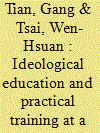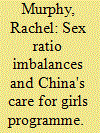| Srl | Item |
| 1 |
ID:
177960


|
|
|
|
|
| Summary/Abstract |
Under Xi Jinping, the Chinese Communist Party is concentrating efforts on the cultivation of outstanding local cadres in order to improve local governance. For this purpose, it is strengthening the functions of local Party schools that offer students both political and administrative education to create a cohort of cadres who are both “red and expert.” We discuss how this is done in terms of curriculum planning, types of classes, and the student pool, using the example of County Z Party School. We find that since the national Eighteenth Party Congress, the Central Committee has reinforced its control over local Party schools to ensure that their curriculum and the methods they use to train cadres are consistent with national Party directives, as part of Beijing’s efforts to strengthen the Party’s grassroots governance.
|
|
|
|
|
|
|
|
|
|
|
|
|
|
|
|
| 2 |
ID:
141099


|
|
|
|
|
| Summary/Abstract |
In China, owing to many parents' preference for sons, the sex ratio at birth (SRB) is imbalanced. During the 2000s, SRB fluctuated at around 120 boys to 100 girls. In the early 2000s, to tackle the SRB imbalance, the Chinese government launched a series of policy measures under the banner of “care for girls.” This article presents a case study of the Care for Girls programme in order to explore how the construction of SRB as a social problem has led to the formulation and adoption of one set of policy responses to the exclusion of others. The analysis shows that the imbalanced SRB has been attributed to rural peoples' cultural and economic deficiencies rather than cast in terms of a need to recognize the inherent worth of girls or a need to ensure that all rural families have entitlements to basic social welfare. This construction of SRB has enabled the Party-state to advance a “care as control” policy response which comprises ideological education, conditional material benefits and sanctions, and which sidesteps the institutional underpinnings of the problem.
|
|
|
|
|
|
|
|
|
|
|
|
|
|
|
|